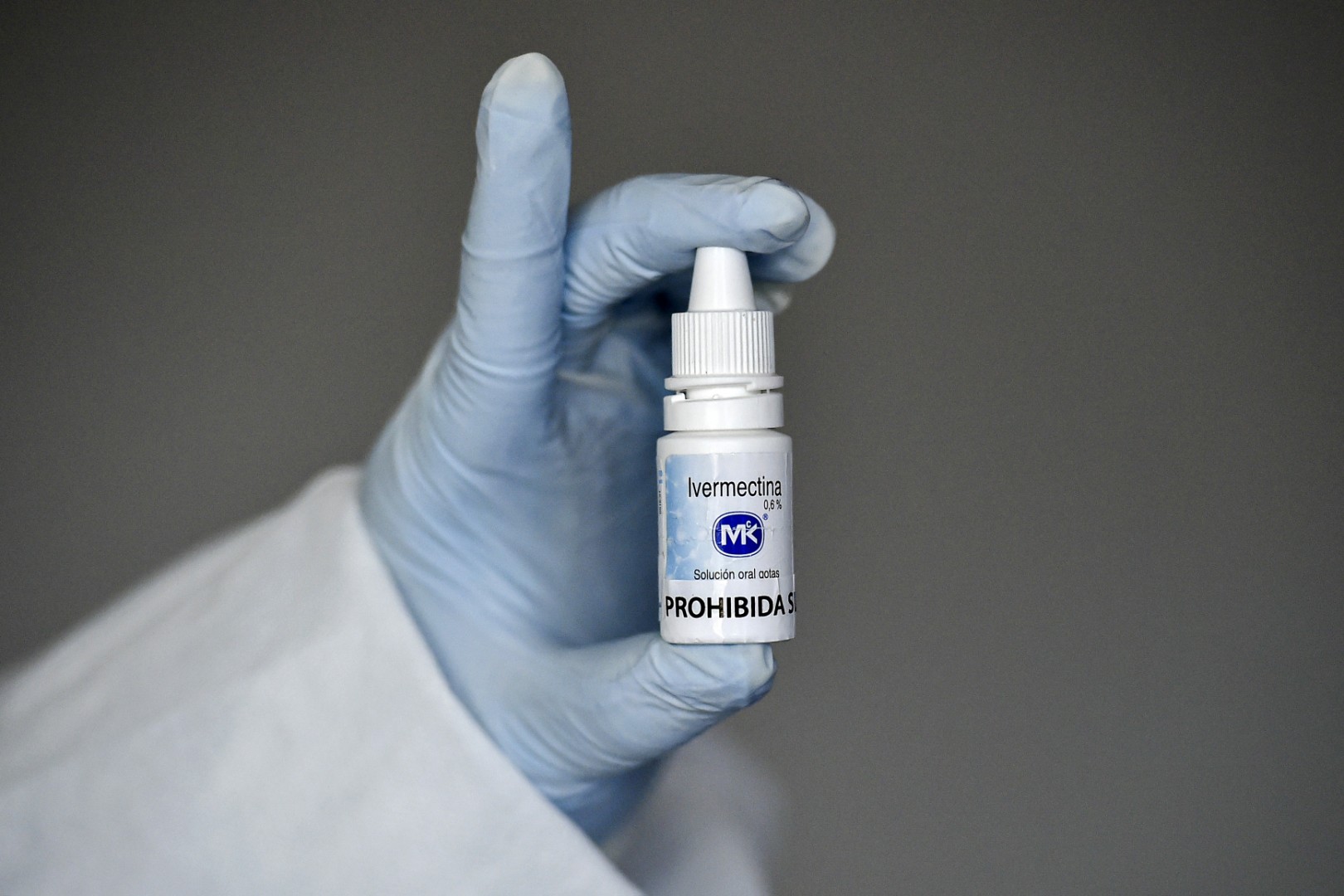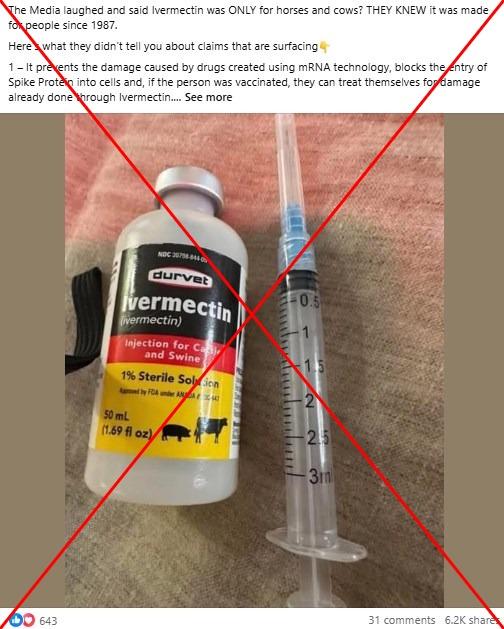
False information on ivermectin continues to circulate worldwide
- Published on May 14, 2025 at 23:01
- Updated on May 16, 2025 at 07:59
- 4 min read
- By Ede ZABORSZKY, AFP Hungary
- Translation and adaptation Marisha GOLDHAMER, AFP Canada
"The Media laughed and said Ivermectin was ONLY for horses and cows? THEY KNEW it was made for people since 1987," begins a May 7, 2025 Facebook post.
It goes on to list 12 uses for ivermectin to treat everything from Covid-19 to cancer.
The image shows an injectable version of ivermectin intended for cows and swine, implying that people should purchase the product in its formulation for animals -- a notion explicitly rejected by pharmacists (archived here).

Canadians posted the same text in French, while AFP identified other posts spreading versions of the claim in Spanish, Hungarian, Dutch, Bosnian, Greek, Czech and German.
Keyword searches revealed the identical text has been shared across social networks since at least January 2025, around the time that actor Mel Gibson made unproven claims about ivermectin curing cancer on Joe Rogan's popular podcast.
This follows years of misinformation about the drug, particularly among those skeptical of the mRNA vaccines developed to protect against Covid-19 (archived here).
The false belief in positive off-label uses for ivermectin triggered legislative moves in several US states to allow access to the drug without a prescription. But a spokesperson for Health Canada told AFP on May 15: "There are no plans to deregulate the sale of ivermectin for human use in Canada, which is a prescription drug."
In Canada, ivermectin is only approved for use by humans to treat "parasitic infections (oral) and rosacea (topical)" (archived here).
Similarly, in the United States, the Food and Drug Administration approved ivermectin tablets "to treat some parasitic worms," while topical formulations are available for head lice and rosacea (archived here).
Ivermectin has been shown to be "clinically effective against certain worm infections and scabies," Akos Heinemann, research head in the department of pharmacology at the Medical University of Graz (archived here), said on April 29.
"Anything else is unsubstantiated speculation based on scientifically untenable data or is simply fabricated," he said.
Potentially dangerous
While the widely shared text focuses on the potential benefits of ivermectin use, the drug has possible serious side effects (archived here).
In 2021, amid increasing calls to poison centers, Health Canada issued a warning against taking ivermectin off-label or in formulations for livestock (archived here). "Canadians should never consume health products intended for animals because of potential serious health risks, including seizures, coma and even death," it said.
A spokesperson for the agency said that advice remains valid in 2025. "Health Canada's stance regarding these medications remains unchanged."
Heinemann said: "Prescribing or taking ivermectin outside of its approved indications is grossly negligent."
Monika Redlberger-Fritz, researcher at the Center for Virology at the Medical University of Vienna (archived here), agreed. "Ivermectin should only be used as authorised; all other uses are not indicated," she said on April 29, 2025.
Covid-19 misinformation
The text shared across social media claims ivermectin "has been associated with a significant reduction in infection, hospitalization and mortality rates" due to Covid-19, but there is no data to back that claim.
During the pandemic, researchers explored whether ivermectin could treat Covid-19, but studies failed to find a clinical benefit.
Health Canada and provincial health authorities, including in Alberta, do not recommend the use of ivermection to prevent or treat Covid-19.
The post also claims that ivermectin cures the "damage caused by mRNA vaccines through spike proteins."
This repeats a recurring false claim that the spike proteins produced after vaccination against Covid-19 cause harm or can be shed to the detriment of others.
Experts estimate the Covid-19 vaccines saved millions of lives (archived here).
Health Canada says the approved vaccines "reduce the risk of severe illness, death and post Covid-19 condition (long Covid)" (archived here).
Clinical trials needed
The social media post further claims that ivermectin kills cancerous cells and prevents their spread, but provides no evidence.
The effectiveness of ivermectin in treating cancer is currently an avenue of research for scientists, but it is far from being considered an alternative to existing treatments experts explained to AFP in French.
Since the mid-1990s, in vitro and animal studies have shown that the ivermectin molecule could have anti-cancer properties.
Jérôme Hinfray, head of scientific information for the French Anti-Cancer League, told AFP in March 2025: "Scientists have shown that the molecule could have antiproliferative properties, which therefore slow the development of cancer cells, and anti-metastatic properties, which would prevent the spread of cancer in the organisms of the animals that were the subjects of the experiment."
However, such studies cannot be extrapolated to humans, and further research and clinical trials are needed, said Claude Linassier, oncologist and director of the prevention, organisation and care pathways unit at the National Cancer Institute of France in March (archived here).
"We cannot in any case transpose data from an experimental model in mice to treatment in humans," he said.
"To claim that ivermectin is effective in curing cancer is certainly false or fanciful and is not based on any scientific data," he warned.
Research shows that cancer arises from mutations in cells, not from an external parasite (archived here), but the false belief that cancer is a parasite also fuels unproven faith in ivermectin and fenbendazole to cure it.
Following Gibson's claim, which was viewed more than 10 million times on YouTube, the Canadian Cancer Society took to X to warn against the "false hope" provided by misinformation on cancer treatment (archived here).
"Surgery, radiation and approved cancer drugs like chemotherapy are safe and proven to stop cancer cells from growing and spreading. Choosing to use an alternative therapy can have serious health effects, such as the cancer spreading or getting worse," the organization said.
More of AFP's reporting health misinformation is available here.
This article was updated to add comment from a spokesperson for Health Canada.May 15, 2025 This article was updated to add comment from a spokesperson for Health Canada.
Copyright © AFP 2017-2026. Any commercial use of this content requires a subscription. Click here to find out more.
Is there content that you would like AFP to fact-check? Get in touch.
Contact us




